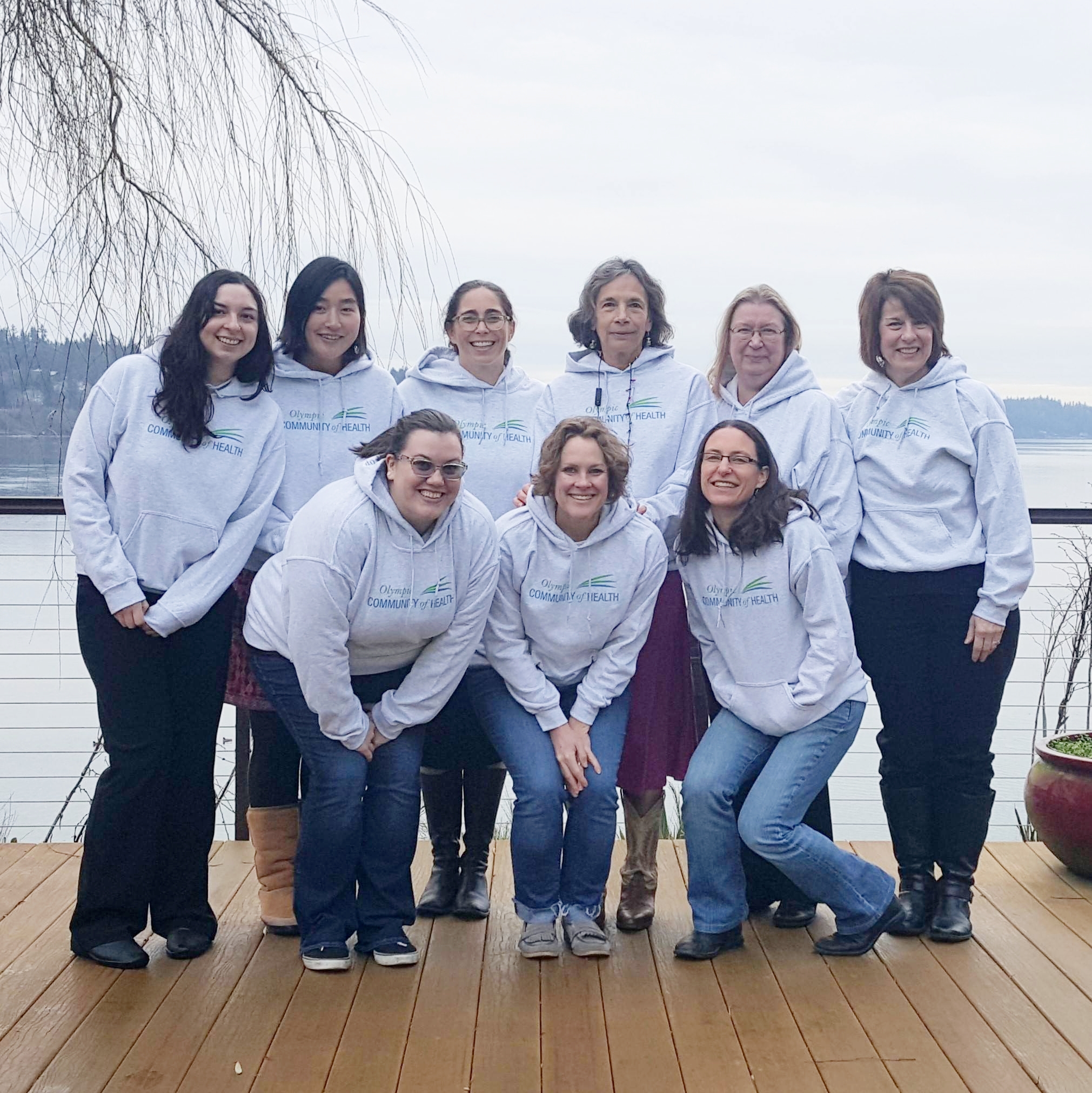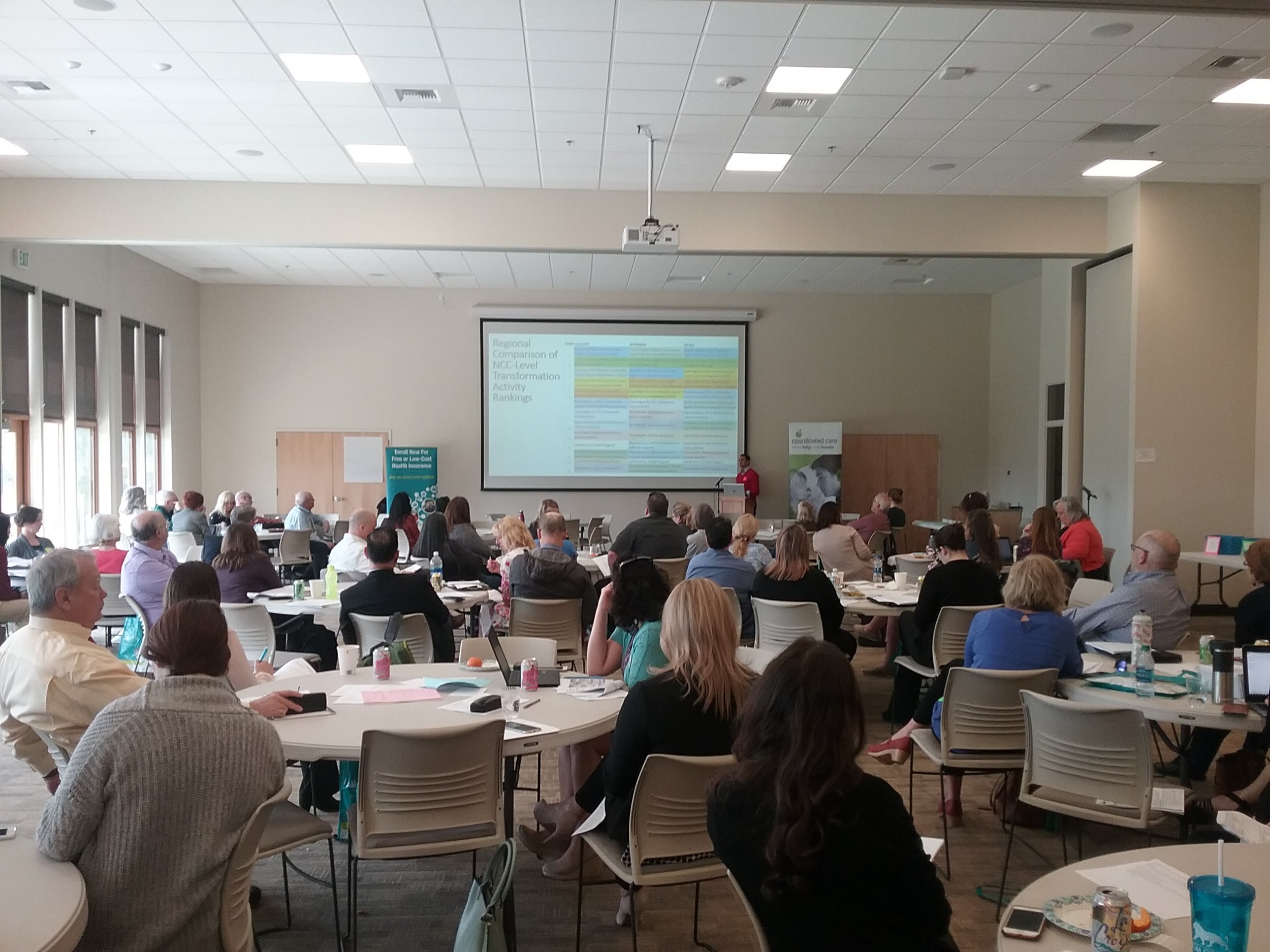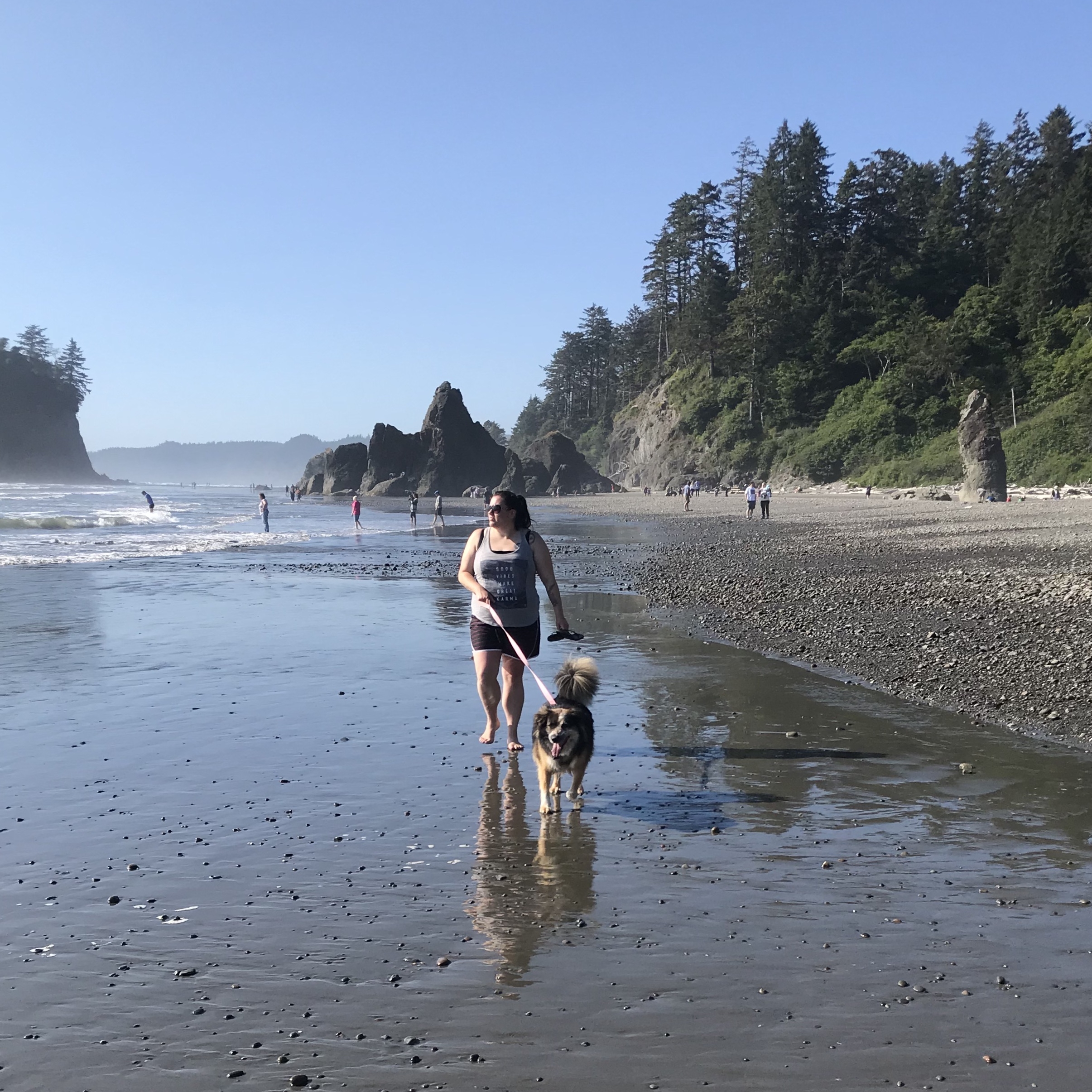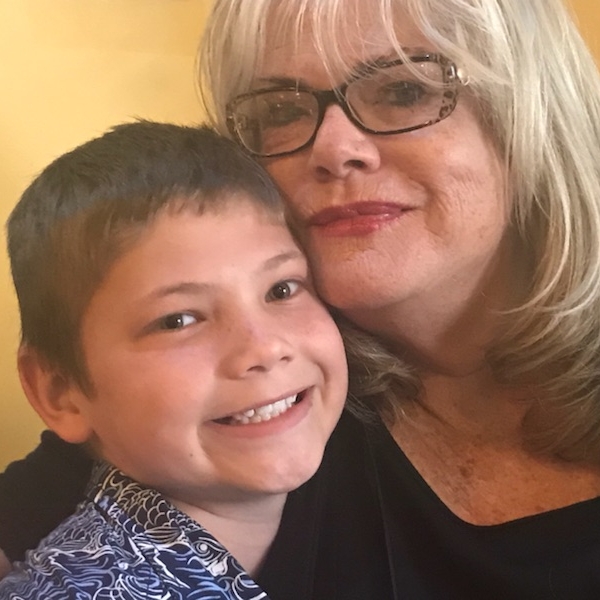Hailing from Pierce County, Maggie Moore thought her career path would lead to becoming a music teacher. Instead, she’s chosen to fearlessly lead the Olympic Community of Health team as Director of Administration.
Maggie, Maggie, Maggie Moore. Her name has a certain ring to it and, in person, she comes alive with all the bells and whistles of a committed professional. That’s because Maggie’s on the move to help make the Olympic Community Health (OCH) a sustaining force—one to be reckoned with, providing strategic care and support services for the locals she and her team look out for across Clallam, Jefferson and Kitsap counties.
“I’m the Director of Administration, serving as the HR person, the finance and budget center, and the general office manager. It’s a role that’s shifted as our team has grown,” says Maggie.
What’s their mission? The Olympic Community of Health partners with several organizations, including physical and behavioral health care providers, local county health departments, community-based organizations such as the YMCA, and the region’s tribes. “Together, we tackle the complex health issues that no single sector or tribe can tackle alone.” Representatives from many organizations also support OCH through advisory services, participation in workgroups and committees, and other activities.
“We’re a very lean organization, smaller than the other Accountable Communities of Health (ACHs) because we serve the smallest population. Most recently, the OCH partnered with local organizations to create Change Plans, implementing the Medicaid Transformation Project (MTP). In other words, OCH contracts with partners to improve the quality of care for Medicaid clients and, by extension, all of the residents of our region,” Maggie elaborates.
That’s what comes across most from the musical and marvelous Ms. Moore—refreshing clarity, keen drive, steady thoughtfulness… and a laugh that won’t quit.
The vivacious brunette, homegrown in Pierce County, loves her job, her dogs Skadi and Odin, Ruby Beach and sweet summer days.
What’s the best aspect of being part of such a tight-knit group?
Together with a diverse range of partners, Maggie (bottom left) and her team at the Olympic Community of Health are tackling the complex health issues that no single sector or tribe can tackle alone.
data-animation-override>
“If something is not worth your bandwidth, then free up your energy for the things that really resonate. Let somebody else do it, while you get busy with what you really want to do in life.”
I think we are very mission-driven people. We come in every day to do work that we really believe in, wanting to change health outcomes for the residents in our region. The efforts that we make can directly benefit the most marginalized or underserved people in this community. We don’t come into OCH to make a profit or sell a product. We come to work to advance health equity and social equity in this part of Washington state. Oh, and we love our acronyms!
How would you best describe a natural community of care?
Natural Communities of Care (NCCs) can be thought of as the team of people who come together to serve the various health needs of the same population. That includes primary care and mental health providers, substance use disorder services, tribal clinics and all the things that you naturally think of when you consider a person’s healthcare network. But an NCC also includes community-based organizations such as housing services, fire departments and family support services. Through their collaborative efforts, these partners can better influence the social determinants of health that affect our residents’ health outcomes.
Can you share Olympic Community of Health’s vision?
We’ve been trying to come up with the 30-second elevator pitch for our group. Let’s see how I do!
Being a catalyst for healthcare solutions is the drive behind OCH. A big part of OCH is to act as a convener and a project manager to help our partners transform Medicaid services and delivery, based on our communities’ specialized needs. Our ultimate vision is a healthier, more equitable, three-county region.
How did you get started?
Washington State Health Care Authority applied for a Medicaid Transformation Waiver through the Centers for Medicaid and Medicare Services. Securing this waiver from the federal government launched several Medicaid-based projects. In the process, they created the ACHs to bring in local voices from the communities we serve.
data-animation-override>
“The political environment around healthcare is constantly changing, so you just kind of push through and maintain the reasons why you got into healthcare in the first place. Let that sustain you through times that are difficult and evolving very quickly.”
For example, there are nine ACHs in our state, each serving different groups of counties. Originally, the entire west coast area was going to be represented by a single ACH. But the people working on the earliest stages of this project realized from the get-go that because Jefferson, Kitsap and Clallam are so remote from one another and different from the counties to the south, they convinced the state that the Olympic region needed to be a separate ACH. OCH first started within Kitsap Public Health District (KPHD) – and a lot of the other ACHs also incubated within non-profits or health departments. In February 2017, we became our own entity.
The tribes are integral to Olympic Community of Health’s success, aren’t they?
Our relationship with the tribes is absolutely stellar. They’re involved in so many ways. They certainly have a voice in the OCH decision-making process, and there are several tribal representatives on our board. To give you an idea of the work we do together: We have engaged some tribal clinics in a project called the Six Building Blocks to Improved Opioid Prescribing. It’s about educating prescribers to support improved practices and policies around opioid prescriptions. We’ve also implemented Change Plans with several of our tribal partners.
Your 2nd Annual Olympic Community of Health Regional Opiod Summit is coming up on October 17. Tell us a bit about what that is.
This work has been going on even longer than the Medicaid Transformation Project because it started when OCH was part of KPHD, so it’s more mature. The summit highlights the work we’re doing with our Three County Coordinated Opioid Response Project (3CCORP) workgroups, the tribes, and the University of Washington Medical Center. These solutions are integrated into summit updates, outcomes and previews around how opioid-specific work is moving forward in the OCH communities.
What’s your top advice for someone wanting to break into the healthcare field?
I think the big thing is that the political environment around healthcare is constantly changing, so you just kind of push through and maintain the reasons why you got into healthcare in the first place. Let that sustain you through times that are difficult and evolving very quickly.
Who’s been your greatest inspiration?
I hate to sound cliché, but it’s actually Elya Prystowsky, our Executive Director. She’s a force of nature, retaining all this information in her head. Elya is so change-driven, so mission-driven. Whenever things get difficult and we’re having a tough time, she’s the one who reminds us why we’re here in the first place, pushing us forward. Always.
When you were growing up, you wanted to be _____________________.
Oh gosh. I actually started in college as a vocal performance major to become a music teacher. Music means everything to me. But I was shocked at the insane amount of pressure there is to be a music major. It’s still one of my biggest passions, but I keep it just as a hobby.
I really like what I’m doing now, being a supporter in a non-profit. Potentially, I’d like to go more toward the environmental side. I think, living in the Pacific Northwest, we all care a lot about clean energy, clean oceans and all of that.
How has being headquartered at Vibe helped build Olympic Community of Health?
data-animation-override>
“Vibe is great because it gives us a space where we can all be together and a little bit more informal and relaxed. Just being able to be really honest—that’s a big thing.”
Vibe is great because it gives us a space where we can all be together and a little bit more informal and relaxed. Just being able to be really honest—that’s a big thing. The relaxed atmosphere, the fun and approachable bunch here, networking and creating connections within the community. And, of course, the conference room! We use it all the time. Our team is spread across all three counties, so Vibe is a terrific central location for us to come together.
Which countries would go on your sparkle list?
Japan, Ireland, Australia, Greece and Kenya. I’ve never actually been out of the US.
You’re having a dinner party. What’s on the menu?
Something vegetarian! I try (and fail) to maintain a vegetarian diet as much as possible, but I really like introducing people to the idea that you can have a delicious hearty meal without a meat dish. One of my go-to favorites is crispy potato tacos. Even the meat-eaters love them.
Tell us a funny story about Skadi.
Well, she’s half Australian shepherd, half border collie, and Skadi is the Norse goddess of the mountains and wintertime. (I also have her brother Odin, named after one of the main Norse gods). Skadi’s the best dog, but she’s also a thief!
My ex-husband and his buddy were making pizza, and they took half and left the rest on the kitchen counter. It disappeared almost instantaneously, and it was clear after they asked each other who finished the pizza that Skadi had jumped on the counter and swiped it without disturbing anything. She’s also known for being able to open the kind of garbage with a foot pedal. She’ll put her pay on the pedal and dig in!
What are you reading these days?
I recently finished Slaughterhouse Five by Kurt Vonnegut, and I’m currently listening to One Day We’ll All Be Dead and None of This Will Matter by Scaachi Koul.
The most romantic movie you’ve ever seen?
I love THE PRINCESS BRIDE. I think I could watch that movie 1,000 times and it would never get old. And I’ve read the book too!
What’s your motto in life?
“If something is really important to you, you will find a way. If it’s not, you’ll find an excuse.” I love that saying, but I think the most important thing to take from it is that if something is not worth your bandwidth, then free up your energy for the things that really resonate. Let somebody else do it, while you get busy with what you really want to do in life.
Meet the author: Vibist Susan O’Meara is a Poulsbo-based freelance writer, editor and journalist with global experience. Back in the day, Susan did event marketing for the electrified Don King, boxing’s bad-boy biz whiz. Then she got roped into writing and producing TV spots for Love Boat: The Next Wave, the ‘90s reboot, and nonfiction programming for Showtime (e.g., Roswell: The Real Story). She’s not sure which was more surreal—going with the flow of those Hollywood highs, so to speak, or navigating Nairobi’s magazine scene. Susan has worked in the US and abroad for the likes of Bloomberg Media, Deloitte, Discovery Communications, and the United Nations. She’s obsessed with wrangling language and messaging that helps brands, businesses, and individuals to grow and shine. Except when it comes to Don King’s hair.





